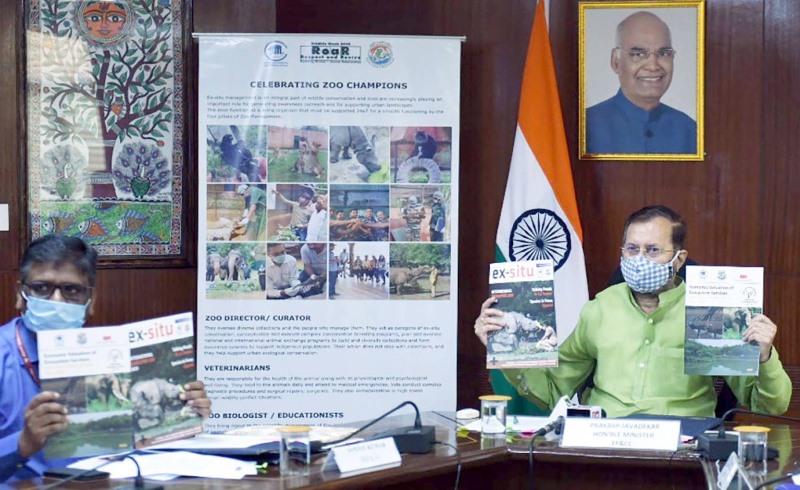Delhi Zoo Provides Ecosystem Services Worth INR 55,000 Crores

Environment Minister Prakash Javadekar recently launched a report highlighting the Ecosystem Services of Delhi Zoo. The Report is published by the Central Zoo Authority (CZA) and is titled Economic valuation of ecosystem services, National Zoological Park, New Delhi. As per this report, the Delhi Zoo provides Ecosystem Services worth INR 55,209.45 crores. This is the total, one-time cost of the benefit obtained from the Delhi Zoo. In addition, the Delhi Zoo provides annual ecosystem services worth INR 422.76 crores per year.
This is claimed to be a first of its kind study in India. The annual ecosystem services calculations includes aspects such as biodiversity conservation, employment generation, carbon sequestration, education and research, recreational and cultural benefits. The report on the benefits of the Zoo was released by the Environment Minister on 5 October 2020 to mark the Wildlife Week. According to the report, nearly 77% of the total annual ecosystem service contribution of the Delhi Zoo comes from recreational and cultural service offered by the Zoo. The Delhi Zoo is therefore a popular spot for recreation and enjoyment by the people. An ethical question to be asked here is that recreation at what (and at whose) cost?
Education and research contributes only about 9% to the total economic value in terms of ecosystem service. This is perhaps an indication that children today are able to view wildlife in a much better way on Ultra High Definition (HD) television and over YouTube. Viewing wildlife in wild habitats will indeed provide a better opportunity to learn about the actual behaviour and habitat of the wild animals. The Economic Evaluation of Biodiversity study has indeed highlighted the diminishing role of Zoos in providing education in the present world.
Ecosystem services our services provided by nature for our survival and are needed to improve the quality of human life. According to the Man and Biosphere (MAB) Programme, ecosystem services can be categorized into four broad types. These are:
- Provisioning services are the products obtained from ecosystems such as food, freshwater, wood, fibre, genetic resources, and medicines.
- Regulating services are the benefits obtained from the regulation of ecosystem processes such as climate regulation, natural hazards regulation, water purification, and waste management, pollination, or pest control.
- Cultural services include non-material benefits that people obtain from ecosystems such as spiritual enrichment, intellectual development, recreational activities, and aesthetic values.
- Supporting services include non-material benefits obtained from ecosystems (e.g. nutrient cycling, soil formation, primary production.
The Delhi zoo was inaugurated on 1 November 1959 and was subsequently given the status of National Zoological Park. It was aimed to become a model zoo in the country. The Delhi Zoo covers a total area of 176 acres and overlooks the cultural landscape of the Old Fort.
The CZA was established to oversee the functioning of Indian zoos and complement wildlife conservation strategies through ex-situ (away from natural habitat of wild animals) measures. The CZA recognizes around 160 zoo and rescue centers across India. Over 567 captive animal species (114 of which fall under the Endangered category) and 56,481 individual animals are currently housed in different Indian zoos.




One thought on “Delhi Zoo Provides Ecosystem Services Worth INR 55,000 Crores”